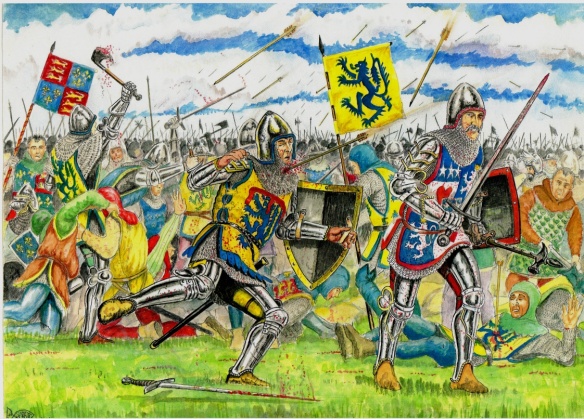
Death of Hotspur at the Battle of Shrewsbury 1403
Percy’s Rebellion
Prominent among those who helped Henry Bolingbroke depose Richard II (1367-1400) to become England’s king Henry IV (1367-1413) were Henry Percy (1342-1408), first earl of Northumberland, and his son Sir Henry Percy (1366-1403), nicknamed “Hotspur” by his Scottish enemies for the alacrity with which he patrolled their borders. A grateful Henry IV rewarded the Percys liberally with lands and offices in northern England and Wales, making them the largest landowners in Northumberland. But their ambitions were deeper than Henry’s purse could ever accommodate- ultimately they sought to control the throne itself. As it happened, they parted ways with the new king over a trifle- falling into a dispute over the ransom of a Scottish rebel. When Hotspur captured the earl of Douglas at the battle of Homildon Hill, Henry demanded the prisoner and claimed the ransom for himself. The break had been building, and now it came-the Percys withdrew their support from Henry and backed Edmund Mortimer.
Mortimer (1376-1413) was the uncle of Richard II’s legitimate heir, the earl of March (d. 1428). He had been captured by the French-backed Welsh rebel Owen Glendower (c. 1359-1416) and persuaded to make common cause against Henry. The Percys dispatched an army to join Glendower, but it was intercepted en route by royalist forces under Henry IV and his son, Prince Hal (1387-1422, later Henry V). On July 21, 1403, the armies clashed in the Battle of Shrewsbury. The Percys were defeated before Glendower could reinforce them. Hotspur fell in battle, and his leaderless troops surrendered.
Sir Owain Glyndŵr, or Owen Glendower
Glendower’s Revolt (1402-1409)
The Welsh had long protested and rebelled against onerous English taxation and inept administration. The situation came to a crisis during the tumultuous reign of King Henry IV (1367-1413) when a wealthy and powerful Welsh lord, Owen Glendower (c. 1354-1416), led a successful campaign against Henry’s garrisons throughout Wales, driving them out of the country.
Glendower was descended from the princes of Powys and had inherited a number of manor properties in northern Wales. As a youth, he was sent to London to study law, then served in the army of Henry Bolingbroke (1366- 1413), who opposed King Richard II (1367-1400). After this adventure, Glendower returned to Wales to discover that oppressive English rule had badly hobbled the Welsh economy and stirred popular resentment.
In September 1400, a year after Bolingbroke usurped the English throne, Glendower engaged in a feud with his neighbor, Reynold, Lord Grey of Ruthin (1362-1440), which rapidly expanded. Proclaimed Prince of Wales, Glendower found allies in the English Edmund de Mortimer (1367-1409) in 1402 and the rebellious Percys in 1403. After Glendower captured the castles of Aberystwyth and Harlech in 1404, he won recognition from France’s King Charles VI (1368-1422), who, eager for any opportunity to oppose the English, struck an alliance with the Welshman. Charles proved an unreliable ally. The troops he repeatedly promised Glendower never materialized, and, as a result, Glendower’s forces suffered defeat after defeat between 1405 through 1409. Aberystwyth and Harlech were soon retaken, and Glendower fled into the remote Welsh mountains, where he died some seven years after the end of the war.
Northumberland’s Rebellion (1408)
Henry IV (1357-1413) could hardly have gained his throne without the support of Henry Percy (1342-1408), first earl of Northumberland, and early in Henry’s reign Northumberland remained an important member of the English Privy Council. But the earl and his son (Shakespeare’s “Hotspur,” Sir Henry Percy [1366-1403]) both grew disenchanted with the Crown when Henry failed to reward them sufficiently for their service in Scotland. They ultimately rose up against the king in PERCY’S REBELLION, which led to Hotspur’s death and Northumberland’s complete alienation. He joined the conspiracy to oust King Henry and replace him with Edmund Mortimer (1376-1409) that lay at the heart of GLENDOWER’S REVOLT. Informed of the plot, Henry caused the arrest of Northumberland’s coconspirators, who were subsequently executed. As for Northumberland, he escaped to Scotland, then to Holland. In the summer of 1406 he returned to Scotland, where he raised a small army to raid the north of England just across the Scottish border. The raids had little effect, and on February 19, 1408, he was trapped at Bramham Moor by a force under the local sheriff, Thomas Rokeby. The rebels were soundly defeated, and Northumberland was among the slain.
Further reading: Bryan Bevan, Henry IV (London: Palgrave Macmillan, 1994). E. F. Jacob, The Fifteenth Century, 1399-1485 (Oxford: Clarendon Press, 1961). John Davies, A History of Wales (New York: Viking Penguin, 1995); R. R. Davies, Age of Conquest: Wales 1063-1415 (New York: Oxford University Press, 2000).